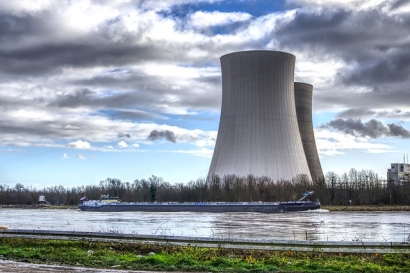
A clean energy source must be sustainable, reliable, and powerful enough to meet consumers’
needs. Nuclear power meets these standards, providing a partial solution for fossil fuel
emissions. Professionals predict its expansion as a carbon-limiting energy source in the near
future.
Nuclear Energy’s Sustainability
Nearly 20% of America’s energy supply comes from nuclear energy. A significant portion of the remaining power supply comes from “dirty” sources, fueling the enhanced greenhouse effect during combustion. Carbon emissions fuel climate change, creating a ripple effect of ecological degradation. The prevention of atmospheric pollution enhances nuclear energy’s sustainability.
Nuclear also produces waste that limits its eco-friendliness. Nuclear power’s reliance on
uranium creates ecological challenges. Uranium production mills produce a sandy process
waste material called tailings. It contains radioactive matter that causes adverse human health effects.
Uranium mill tailings stay radioactive for over a thousand years. Short-term exposure to
radiation causes nausea, vomiting, and hair loss. Long-term exposure increases one’s risk of
cancer and cardiovascular disease.
Scientists developed safe handling and disposal methods, decreasing human interactions with uranium waste. Professionals store high-level waste for extended amounts of time, helping its radioactivity drop before sending it to a disposal center. In other cases, individuals take low-level nuclear waste directly to waste management facilities.
With effective disposal methods, nuclear energy can sustainably support carbon-free power production. It is essential to remain aware of its effects on humans and ensure safe handling.
Emission-free power also enhances the reliability of a clean electric grid.
Nuclear Energy’s Reliability
The Biden Administration also plans on decreasing America’s reliance on fossil fuels by
developing a greener electric grid. Unlike solar and wind power, nuclear energy does not rely on weather patterns. It produces electricity nearly 93% of the time.
Nuclear energy plants require little maintenance and operate for extended periods before
needing more fuel. Its only reliability challenge is the limitation of Earth’s uranium supply.
Researchers predict the available stores may support energy production for the next 1,000
years.
This non-renewable feature of nuclear power production will eventually decrease its reliability.
Some scientists believe more deposits will become available in the coming centuries. However,
currently, its limitations challenge the energy source’s longevity.
Nuclear Energy’s Efficiency
The major challenge associated with solar energy production is its relatively low efficiency.
Photovoltaic (PV) panels generally achieve a 20% efficiency rate, limiting solar’s support of a
green electric grid. Nuclear power plants are more efficient and offer more energy using fewer
resources.
Electricity derived from nuclear power can achieve up to a 37% efficiency rate. Its increased
production rates, reliability, and carbon emission-free properties make it an ideal substitute for
fossil fuels.
Benefits of Carbon-Free Power
Nuclear power benefits the global ecosystem by preventing further temperature increases.
Maintaining a consistent climate protects habitats, food sources, and more, preserving
biodiversity. It also prevents humans from the adverse health effects of air pollution.
As greenhouse gas emissions rise, individuals experience increased risks of lung cancer,
strokes, and heart attacks. Poor air quality also causes wheezing, chest pain, shortness of
breath, asthma attacks, and more.
Climate change also decreases Earth’s ability to produce food, increasing the rate of starvation.
Nearly 820 million individuals already experience hunger annually. The starvation rate will rise if climate change continues altering Earth’s surface.
Similarly, evaporation associated with rising temperatures may increase the global dehydration
rate. Nuclear energy can reduce climate change’s adverse effects by decreasing the amount of
carbon in the atmosphere.
Diversifying the Electric Grid
The nation can expand its use of clean power by utilizing nuclear energy’s electricity output for
the grid. When communities combine various power sources, like nuclear, solar, and wind, they can produce an abundant and reliable electricity production and distribution system. The
multiple benefits of uranium-derived power can protect humanity and the environment while
expanding society’s access to sustainable energy.
Author bio: Jane works as an environmental and energy writer. She is also the founder and editor-in-chief of Environment.co.

